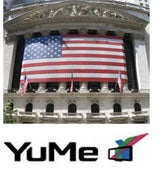 As of today, YuMe is the latest video ad-tech company to officially go public, and although it has posted clearly strong revenue growth and profitability in the past year, the company’s IPO has been priced at $9 per share, according to an SEC filing late Tuesday night. Read it here.
As of today, YuMe is the latest video ad-tech company to officially go public, and although it has posted clearly strong revenue growth and profitability in the past year, the company’s IPO has been priced at $9 per share, according to an SEC filing late Tuesday night. Read it here.
YuMe is selling 5.1 million shares, which values the deal at roughly $46 million; the Redwood City, Calif.-based company had hoped to raise about $65 million when it unveiled its plans last month.
Judging from this early reception, it would appear that YuMe’s entry into the public markets will not be easier than that of Tremor Video, which has seen its stock price slide roughly 16% since its CEO, Bill Day, rang the opening bell at the NYSE on June 27. Tremor’s IPO was priced at $10, just under the previously set sales target between $11 and $12 per share the company had in mind when it first filed its S-1 in May. Tremor will release its Q2 earnings Thursday afternoon.
YuMe’s inability to achieve its target price range largely has to do with the volatile stock market and investors’ general uncertainty about the prospects of companies in unfamiliar territory, such as video advertising, especially in an increasingly crowded IPO season.
It’s tempting to suggest investors may be souring on another video ad-tech company so soon after Tremor’s IPO. Tremor’s performance probably does hold some influence here, but investors have had a good chance to compare the basics between the two, as well as consider YuMe’s strengths and weaknesses.
For the most part, YuMe started the year looking strong, posting a decent profit of $6.3 million in 2012. But that was a recovery from a loss of $11.1 million in 2011. For the first three months of 2013, YuMe again returned to the losing column, as losses for that period widened to $3.3 million from $1.5 million during the same time in 2012.
Nevertheless, revenues have been consistently robust. Total revenues in 2012 were up 70% to $116.7 million. For the first three months of 2013, YuMe’s revenues grew 33% to $26.6 million.
Over at Tremor, the company’s total revenue for 2012 was up 16%, from $90.3 million to $105.2 million year-over-year, while its net loss decreased only slightly, from $21.0 million to $16.6 million. In contrast to YuMe’s difficulties during the first three months of 2013, Tremor’s revenues shot up 43.4% year-over-year, while its net loss decreased from $9.1 million to $5.2 million.
Much has been made of Tremor’s struggles and now YuMe, despite its bright prospects, will find itself in a defensive position. Over the past two weeks, Tremor has tried to fight back with a flurry of news releases touting several new hires, such as the appointment of Tim Ware, the former Wall Street Journal mobile and video ad-sales director, to head its mobile and connected TV sales, and various improvements to its product line, such as creative enhancements to its agency-facing VideoHub unit.
In any case, the stock prices of both Tremor and YuMe, both of whom emerged from the traditional ad-network model more than four years ago, will surely have time to prove themselves.
In the meantime, two other video ad-tech players, Adap.tv and BrightRoll, both of which are positioned as programmatic marketplaces for ad buyers and sellers, have been considering their own respective IPOs. The reception of Tremor and YuMe will weigh more heavily on their minds than the publishers and marketers who continue to drive the growth of the video ad market. And no matter how individual or a pair of stocks do right now, that won’t diminish the space’s established path toward taking a bigger piece of ad budgets and inventory.











